- Home
- Linda Byler
Christmas Visitor
Christmas Visitor Read online
Chapter One
Chapter Two
Chapter Three
Chapter Four
Chapter Five
Chapter Six
Chapter Seven
Chapter Eight
Chapter Nine
Chapter Ten
Chapter Eleven
Chapter Twelve
The Glossary
About the Author
It was the rocking chair’s squeak that started the tears. The high, annoying chirp would have driven him to find the WD-40, turn the rocker upside down, and liberally spray the irritating spot, satisfied only when it was completely silenced.
She could smell the WD-40. She could see him kneeling there—his dark eyebrows drawn down in concentration, his eyes flat, the perfect nose beneath them, his wide mouth unsmiling, but only for a short time. He was known to talk a lot and smile as much, his hands moving, alive, so animated, so interesting.
She didn’t realize right away that her tears were falling on little Benjamin. They dampened the downy hair of the five-week-old son she was holding, darkening and flattening it in sections. Clucking and crooning, she moved a thin finger delicately across the wet spots, trying not to wake him, and then bent her head to kiss the warm, rounded cheek.
Here in her arms lay Ben’s final gift to her, born three months after Ben had fallen at the barn raising at Elam Glick’s down along 896 near Christiana. Ruth never had a chance to say goodbye.
Life went on, she found. It moved right along, whether she decided to go with it or not. It was impossible to speak of her grief and express it properly when it was a twisting, tumbling void that threatened to swallow her up the minute she didn’t move along with life. Her children were the motivation that got her up and moving after she’d been chewed up and spit out after the viewing and the funeral.
The rain that day had been so fitting. The weeping pines bent their fragrant green boughs to allow the fresh April showers to drip from one branch to the next below. The black umbrellas sprouted like grieving mushrooms with the black-clad members of the Old Order Amish huddled beneath them.
Rows of horses and buggies were tied along the well-kept white painted fence. Numbers had been chalked in white on the sides of the gray buggies. Ruth had ridden in the buggy marked with a simple 1. The first buggy. His wife and children following the coffin, a plain wooden box laid reverently in the horse drawn hearse.
Back at the farm, where the services had been held in the shop, the women had packed sandwiches of Lebanon bologna and white American cheese with mayonnaise on wheat bread. It was a token of sark feltich (caring) hearts, as was the custom, a snack to tide them over after the long services and a boost of nutrition for the children before the burial.
She couldn’t keep him, although she’d tried, touching that lifeless face just once more. In the end, as the minister’s voice droned on in a singsong cadence and the pines wept, they had closed the coffin and lowered it, and the granules of Lancaster County soil hit the wood with a sound that was now a permanent part of her.
The smell of wet soil would always remind her of that day. So would Lebanon bologna.
“Mam!”
The call pulled her abruptly back to reality. Struggling, she tried to get out of the chair and then answered, “Lillian, ich komm! (I come!)”
Tenderly Ruth settled little Benjamin, pulling the soft baby blanket up to his waist, no farther, for in August the nights were warm. She moved swiftly down the short hallway into her bedroom where Lillian, the rowdy three year old, sat straight as a small tree trunk, saying she was thirsty. She wanted chocolate milk, but Ruth said, no, no chocolate milk, just water. Even when Lillian kicked off the covers and threw a fit, she remained firm, gave her a cold drink of water, and promised chocolate milk in the morning.
She checked on the older girls. Barbara was on her side, her shoulders rising and falling beneath the thin, handed down nightgown, the one Esther had worn for many summers.
She listened at the door of the boys’ room, but all was quiet and peaceful, the darkness a comfort somehow. Roy was nine and Elmer ten. They were lively young boys with energy to spare, now that they’d been transplanted to the small rancher with vinyl siding on Hoosier Road.
She couldn’t have kept the farm, with the depressing economy, so they said. A recession. Land prices had fallen—were falling. So she’d sold out to the highest bidder. The amount fell short of the accumulated debt. As was the custom, the people stood by her with donations, alms, and benefit suppers. It had all amounted to an amazing sum.
Levi King had provided the house. She had no income, other than her quilting. There was nothing else she could do, with six children to care for. If she did get a job, which she would need to do—and soon—she would simply need to hire a babysitter, the way the English people did. She didn’t have much choice.
The church “kept” their widows as did kind relatives. Her parents, his parents—they all gave and sarked (cared for) Ben sei Ruth (his wife, Ruth). But she could not go on sponging off of others forever.
She showered and shampooed her thick brown hair, donned a thin nightgown, and pulled a hairbrush through her heavy, wet tresses.
Ruth Miller was only thirty years old—small, petite, and much too young in appearance for her thirty years. She leaned over the bathroom sink to fasten the snaps of her cotton robe, pulled back her hair, and went outside to sit on the porch to allow her hair to dry, if only for a moment.
The crickets were noisy, and the katydids noisier still, shrieking their plaintive cries from the locust tree by the shed. The sky was alive with twinkling stars, but the leaves of the old oak tree hung limp in the hot August night with hardly a breeze to stir them. Somewhere a lonesome dog howled, starting up a series of sharp yipping from a neighboring one.
Ruth lifted her face as she loosened her hair and ran her fingers through it to help dry faster.
Well, Ben, it’s been a long day. I think little Benjamin will be very much like you. Active, alert, quick to speak. Lillian just drives me crazy. I never was good with her. I can’t start pitying myself now, but you were so perfect for her. I think that is part of her problem.
Elmer had a bad day. He helped Priscilla pull corn for the roadside stand, and she wouldn’t allow him to sell any—just sent him home with five dollars for three hours of work. Is that fair?
Ben, how am I going to make it? Coal is up to two hundred and some dollars a ton. I could burn wood, but is it really much cheaper? I can’t afford propane.
Esther needs to have her eyes examined, I feel sure, but there is no extra money. I’m too proud to beg. And I’m afraid I’m not very good with the money I do have. I bought two rugs at Walmart, along with my groceries, and now I feel I shouldn’t have.
What about Esther’s eyes?
Ruth watched the stars, as if one might answer, then closed her eyes and prayed to the One far above the stars, the Presence in whom she placed her faith from day to day.
“Unser Vater in dem Himmel (Our Father who art in Heaven),” she murmured.
Later, she fell asleep the minute her head touched the pillow. She slept dreamlessly until Benjamin became restless and woke her with his soft little grunts, turning his head from side to side as the hunger in his little belly disturbed him.
Ruth sighed, knowing it would do no good to try the pacifier. She rolled out of bed, gathered him up, and cuddled him beside her.
The sun soon emerged above the horizon, and she knew the pulsing orange ball of heat would send the mercury on the old plastic thermometer up to well past 90 degrees.
She was up and dressed by six o’clock, wearing a blue, short-sleeved
summer dress with a black bib apron tied over it and her washed and well worn white organdy covering pinned neatly on her head.
It was always good to get an early start. Quietly, her bare feet whispering across the floor, she picked up the plastic Rubbermaid hamper from the corner of the bathroom. She grabbed the dripping washcloth she saw dangling from the side of the white bathtub and threw it on top. She carried her load to the laundry room, where the Maytag wringer washer stood solidly attached to the floor, the plastic rinse tubs beside it.
As quietly as possible, she opened and closed the screen door, then hurried to the diesel shanty attached to the barn. There she flipped a switch, turned the key, and was rewarded by the grinding sound of the Lister diesel engine coming to life.
Blue smoke puffed from the gray exhaust pipe, staining the cement blocks around it with a black ring as usual. She closed the diesel shanty door and hurried back to the house.
There was always pressure on wash day to hurry and finish before the little ones awoke. She should be okay today—Benjamin’s last feeding had been at four thirty—if Lillian stayed quiet.
Water gushed out of the hose with a turn of the spigot, filling the large washer. She added a cup of Tide with Bleach and opened the handle on the air line, allowing the compressed air from the tank behind the diesel shanty to power the air motor beneath the wringer washer with a rhythmic movement.
Quickly, she separated the laundry. Whites went in first. She closed the spigot after the rinse tub was full and added a capful of Downy, then went to put the teakettle on for her coffee.
She could already feel beads of sweat forming on her upper lip and glanced at the thermometer. She resigned herself to the heat but sighed when she heard Lillian’s grumpy howls from the bedroom. Tying on the apron filled with clothespins, Ruth scuttled back the hallway saying, “Shh!”
Lillian was not happy. Her eyes were heavy with drowsiness from waking up before she was really finished sleeping, and she was every bit as ill-tempered as usual. Ruth swept her up, wrapped her arms around the small form of her daughter, and held her tightly, raining teasing little kisses on her sticky face.
Lillian fought, turning her head and grimacing, her pigtails stuck out in every direction, her muffled laughter emerging.
“Do net! (Don’t!)”
“My funny girl! You’re going on the couch!”
Dumping her unceremoniously on the blue sofa, Ruth pulled the lavender nightgown over Lillian’s bent knees and pressed down on her legs, making her bounce slightly.
“Do net!”
But she was giggling, her round face wreathed in smiles, her blue eyes creased at the corners, and Ruth smiled back.
“I want chocolate milk!”
How could one mighty little three year old remember, through eight hours of sleep, that she had wanted that chocolate milk the night before and was refused?
She never gave up, often being “chastened” for outright disobedience. If she was told repeatedly not to get into the pea patch, that was exactly where she was fifteen minutes later, like a little rabbit, hunkered down and eating peas as fast as she could, her blue eyes completely innocent.
Ruth would not allow the despair to penetrate her sense of well-being. She pushed back the sinking feeling of being completely incapable of handling her six children, her life. It was one day, one hour at a time.
If Lillian had been promised chocolate milk the evening before, that is what she would have. Ruth stirred Hershey’s syrup into the cold milk in the Sippy cup and took it to Lillian, who smiled widely, without remembering to say thank you.
Ruth hung the whites on the wheel line, pushing the clothes out over the back yard after pinning them securely with wooden clothespins from the apron around her waist.
The air was still and already humid. She heard the purring of the diesel back on the farm, the rhythmic clip clopping sound of an approaching team, robins scolding from the electric wire beside the road.
She’d mow the grass today after she finished her cleaning. It was Friday, the day she usually accomplished all three major tasks of cleaning, laundry, and yard work. The boys would pull weeds in the garden and push the hand cultivator through it.
The door opened only a sliver, and bright blue eyes peeked out. The door was pushed open wider, and a tousled head appeared, followed by “Hi, Mam!”
“Well, good morning, Barbara!”
“Are you good?”
“Yes, I’m very good.”
“Did you sleep good?”
“Oh, yes!”
Barbara came over and laid her head against Ruth’s waist as her arms went around her mother. Ruth held her close, a wet washcloth clutched in her hand. She inhaled the sun and dirt and not quite properly rinsed hair.
“Mmm, Barbara. Ich gleich dich so arich (I love you so much).”
Barbara was the one endowed with a caring spirit, loving and gentle and kind to all, except for Roy. Roy was the one single irritant of her life, the fly in her chicken corn soup, the rain on her parade, the fingernail across her blackboard.
“Esther’s awake.”
“Good. Is she with Lillian?”
“Yes. Lillian wants Trix.”
“Did she get her some?”
“They’re all gone.”
“Would you please check on the baby?”
Barbara left immediately, and Ruth shook her head, always appreciative of her five year old’s willingness to obey.
They ate dippy eggs, stewed saltine crackers, and buttered toast for their breakfast as they sat gathered around the kitchen table near the sunny east windows. The windows sat low in the wall, allowing all that morning light to enter.
The table was a solid oak extension one, made by Noah Fisher down below Atglen before Ben and Ruth were married. The chairs were wheat chairs, the spindles on the back splayed out so that they resembled sheaves of wheat, all made of solid oak.
The tablecloth on the table was a durable double-knit fabric from Lizzie Zook’s Dry Goods Store in Intercourse. Ruth had hemmed it herself, and it was a fine red and white gingham, serviceable for years, as long as she used her dependable Shout spray on the grease spots before immersing it in the hot water in the wringer washer.
Ruth’s dishes were Corelle, the set her sisters had given her on the day she became Ben’s bride. She still had most of them after eleven years, which was remarkable considering what they’d been through.
The kitchen cabinets were oak as well, fairly new, with the gas refrigerator set neatly in the space created for it. A healthy green fern sprouted from a brown pot suspended above the sink by a macramé holder, and the canister set was brown ironstone to match. By the low windows, there were more potted plants—a fig tree, another fern, and a few African violets.
The hutch against the west wall was made by Noah Fisher as well and contained the china that Ben had given her a few weeks before the wedding. He’d been so humble, almost shy.
Ruth loved pretty things, her artistic touch showing in her ability to maintain a nice home, although it was all done in simplicity, with common sense, the way the Amish ordnung (rules) required.
She felt blessed, having this small single story house and being able to live in it without paying rent. Levi King simply refused it, and Lizzie told her in whispered tones they wouldn’t feel right taking her money, then closed her eyes and kept them closed for so long that Ruth had a terrible urge to laugh. Then she felt like crying and wringing this dear, plump woman’s hand, but she just gave up and hugged her. Without the support of the Amish community, she’d never make it—that was one sure thing.
Her family’s support was tremendous, her bank account still containing the last of their generosity. Her emotional support was bolstered frequently by caring relatives and was as essential as the air she breathed. But some things can only be spoken in solitude, things other pe
ople need not know.
Elmer and Roy did a good job in the garden, for all of thirty minutes, before they gasped and staggered toward the old oak tree, flopped down on their backs, and flung their arms across their foreheads—each movement seemingly synchronized, like swimmers.
“Mam!”
The howl was in unison, too.
Ruth stopped pushing the reel mower and wiped the perspiration from her forehead as the blood pounded in her ears. She answered with a calm, “Yes, boys.”
“It’s too hot! It’s cruel to make us work in the garden.”
“Oh, come on! You’re men. You’re tough!”
Elmer’s head flopped back and forth as if it hadn’t been properly attached.
“It’s 100 degrees,” Roy wailed, his despair bringing a deep mirth from someplace Ruth had almost forgotten.
It would soon be five months since Ben had fallen, leaving her to journey alone. She had never thought she would laugh ever again, certainly not within five years. But life kept on going. And it was the children that mattered. They gave her reason to go on living. And here was Roy, making her laugh, deeply and sincerely.
Flopping down to sit beside them, she bowed her head and gave in to her laughter, squeezing her eyes shut, lifting her face, and howling with it. She didn’t cry hysterically at the end either.
Roy and Elmer looked at their mother, then both sat up and watched her with serious concern.
“Oh my!” Ruth gasped, wiping her eyes. “Sorry, I wasn’t schputting (mocking) you.”
Roy eyed her warily.
“Yes, you were.”
“Nah-uh!”
“What else was it?”
“I guess it just struck me funny, because I’m hot and miserable, too. It is too warm. But I’m almost finished. We’ll come back out this evening, and you can finish the garden while I run the weed eater.”
Elmer looked as if he couldn’t believe his good luck.
“Can we go swimming?”
Ruth considered his question.
“Would it be possible to pick the green beans and take them to Mrs. Beadle first?”

 A Second Chance
A Second Chance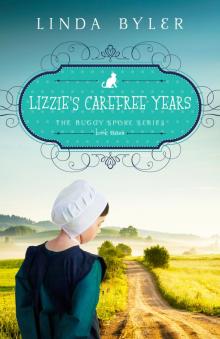 Lizzie's Carefree Years
Lizzie's Carefree Years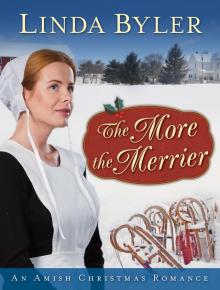 The More the Merrier
The More the Merrier Love in Unlikely Places
Love in Unlikely Places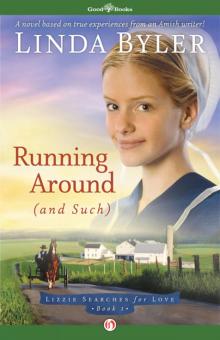 Running Around (and Such)
Running Around (and Such) Wild Horses
Wild Horses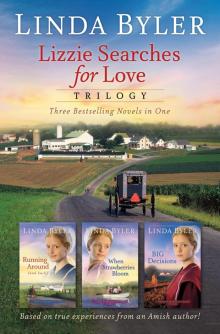 Lizzie Searches for Love Trilogy
Lizzie Searches for Love Trilogy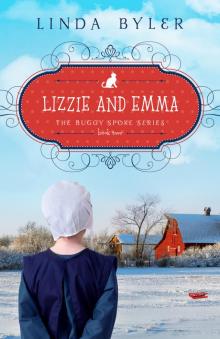 Lizzie and Emma
Lizzie and Emma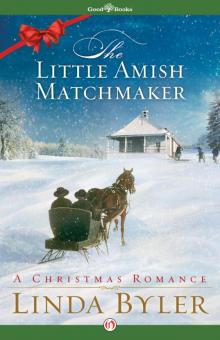 Little Amish Matchmaker
Little Amish Matchmaker The Witnesses
The Witnesses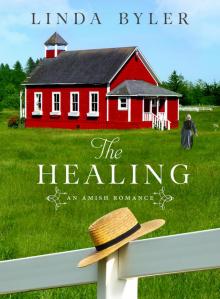 The Healing
The Healing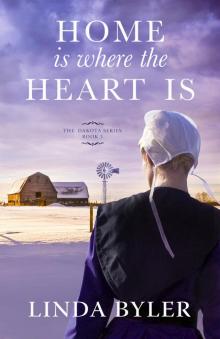 Home Is Where the Heart Is
Home Is Where the Heart Is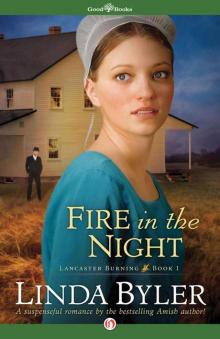 Fire in the Night
Fire in the Night When Strawberries Bloom
When Strawberries Bloom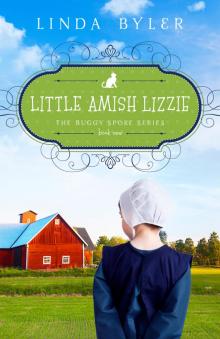 Little Amish Lizzie
Little Amish Lizzie Which Way Home?
Which Way Home?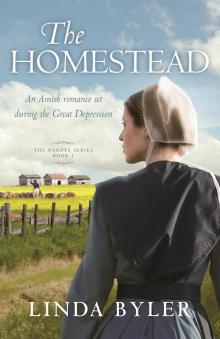 The Homestead
The Homestead Sadie’s Montana Trilogy
Sadie’s Montana Trilogy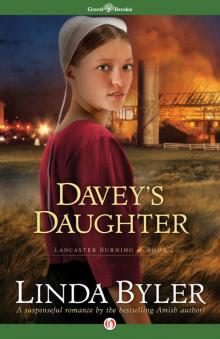 Davey's Daughter
Davey's Daughter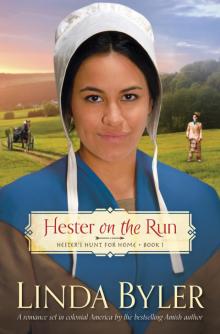 Hester on the Run
Hester on the Run Disappearances
Disappearances Big Decisions
Big Decisions Becky Meets Her Match
Becky Meets Her Match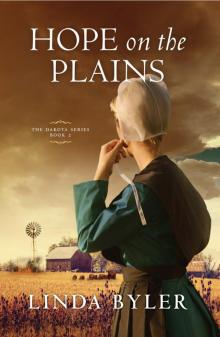 Hope on the Plains
Hope on the Plains Christmas Visitor
Christmas Visitor